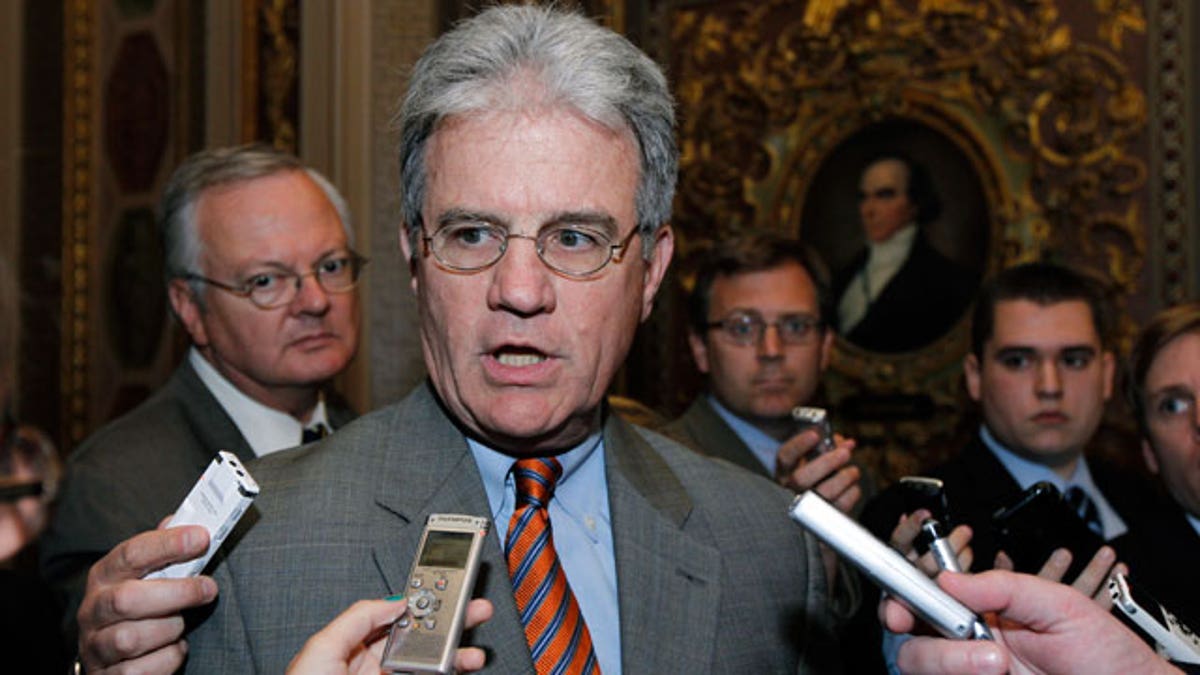
Sen. Tom Coburn, R-Okla., talks with reporters before their caucus luncheon on Capitol Hill Tuesday, June 14, 2011 in Washington. (AP)
The Senate on Tuesday rejected a proposal that would have eliminated ethanol tax credits worth $5 billion a year -- a stunning setback for conservatives who were rallying around it in recent days as a way to reduce the national debt.
Sen. Tom Coburn's, R-Okla., measure only drew 40 votes, way short of the 60 needed for passage. The proposal would have repealed a 54-cents-a-gallon tariff on imported ethanol, which restricts imports, mainly from Brazil.
Coburn forced a vote on his amendment to a bill that would renew a federal economic development program by filing cloture on it -- a rare procedural tactic that is usually employed by the majority party. But his maneuver backfired as angry Democrats revolted, a senior Democratic leadership aide told Fox News.
The ethanol industry and the powerful Americans for Tax Reform, among others, mobilized against Coburn, despite other conservatives, including the influential Club for Growth, supporting the amendment.
Senate Majority Leader Harry Reid said he'll give the effort another chance next week but Sen. Diane Feinstein, D-Calif., will offer the amendment instead. It may also include an effort to truly "open up the market" to alternatives" according to Sen. Tom Harkin, D-Iowa.
Coburn's effort had brought together two sides who rarely agree on anything: conservatives and environmentalists.
A coalition of different-minded groups, including the Sierra Club and the Union of Concerned Scientists, drafted a letter in March voicing support for ending the subsidy. Other groups in the coalition included Oxfam America, the National Restaurant Association and assorted meat, poultry and dairy producers.
Coburn argued that the tax credits are wasteful subsidies for an industry that no longer needs them.
"The days of placing spending programs in the tax code and giving them holy status are over," Coburn said. "Ethanol is bad economic policy, bad energy policy and bad environmental policy."
But, in a situation where the subsidies cross regional lines as much as political ones, ethanol supporters say with gasoline prices hovering near $4 a gallon, it is no time to repeal tax credits that encourage alternative fuels.
"Ethanol is the only viable alternative to imported oil available to us today, an inconvenient truth for those seeking to protect the oil status quo," said Bob Dinneen, president of the Renewable Fuels Association.
Together, the interest groups gave $21.9 million to senators in support of the amendment, 17 times as much as opponents who donated $1.2 million, according to Maplight.org, a research group that exposes the influence of money on politics.
President Obama, who has insisted that the federal government drop $4 billion in subsidies for oil companies, supports reforming the ethanol subsidy system, but does not support repealing ethanol subsidies altogether, White House spokesman Jay Carney said Tuesday.
And the Advanced Ethanol Council (AEC), a recently formed advocacy group, warned Senate leaders Tuesday that an abrupt end to the subsidies would destabilize the entire ethanol industry and the progress of new ethanol technologies.
"Maintaining stability in the ethanol industry, including but not limited to tax policy, is critical to the development and commercialization of advanced ethanol fuels," AEC Executive Director Brooke Coleman said in a letter to Senate Majority Leader Harry Reid and Senate Republican leader Mitch McConnell.
Coleman said it is "unfortunate" that some senators want to end what he called one of the nation's most successful renewable energy tax polices without taking a similar approach to oil subsidies.
"The clear signal sent to the investment community is that the U.S. commitment to the continued evolution of the biofuels industry is tenuous," he said.
Ethanol is a renewable, liquid fuel additive made from fermenting plant sugars, typically from corn. The tax credit provides 45 cents a gallon to oil refiners who mix ethanol with gasoline. Corn growers support the tax credit because it helps increase demand for their crops.
"Sen. Coburn's amendment would raise the tax on domestic energy production by repealing an incentive for the use of homegrown ethanol," said Sen. Chuck Grassley, R-Iowa. "With conflicts in the Middle East and crude oil priced at more than $100 a barrel, we should be on the same side. Why would anyone prefer less domestic energy production?"
Sen. John Thune, R-S.D., said, "It seems ironic that we would be looking at legislation, at policy that would further drive up the costs of gasoline in this country."
Sen. Jim DeMint, R-S.C., is proposing an alternative that would repeal subsidies but also eliminate the estate tax, which Republicans say disproportionately hurts family farms.
The ethanol tax credit is part of a package of business tax breaks that Congress usually renews each year. The current credit is scheduled to expire at the end of the year. Coburn's amendment would have repealed it immediately.
The Wall Street Journal on Tuesday highlighted a new study by 10 international organizations, including the World Bank and five different arms of the United Nations, that blames biofuel subsidies as among the leading causes of agricultural price shocks.
"These are people who not only don't object to taxpayer subsidies of unproductive activity -- their livelihoods depend on them," the newspaper said in an editorial. "Yet they are unanimous in calling for an end to biofuel subsidies. Any policy opposed by both the Club for Growth and the U.N. must belong in the government boondoggle hall of fame."
Fox News' Trish Turner contributed to this report.












































